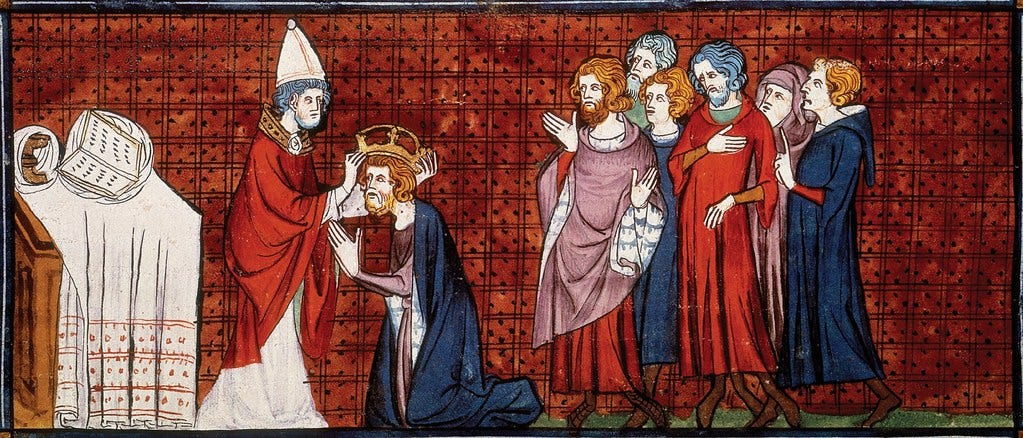Leo III: The Coronation of Christendom
The Third of the Leos | Pope St. Leo III (795–816 AD)
“It is God who judges between us. Let Him show who is faithful.”
— Attributed to Pope Leo III, at the trial of his enemies
If the first Leo roared to defend the Incarnation, and the second whispered precision into the wounds of heresy, then Leo III wielded his voice not only in doctrine, but in history itself—altering the shape of Western civilization with one act that echoed across the centuries:
He crowned an emperor.
It was Christmas Day, 800 AD, and all the splinters of a shattered Rome gathered into a fragile hope. The Pope took a crown in his hands and placed it upon the head of Charlemagne, King of the Franks. With that single gesture, the Holy Roman Empire was born—not a mere political alliance, but a new vision of Christendom. A baptized world, where throne and altar would walk—if not in peace, then at least in tension.
The Man from the Shadows
Leo was born into obscurity in Rome, likely of Greek descent. He had served as a cardinal-priest and was elected pope on December 26, 795 AD, the day after the death of Pope Adrian I. His election was quick, even suspiciously so. He sent word immediately to Charlemagne, requesting his confirmation—not as a vassal, but as a protector.
From the start, Leo’s papacy was under siege.
The Roman nobility hated him. Accusations, some likely false and others exaggerated, were leveled against him: perjury, adultery, and unfitness for office. In 799, he was attacked in the streets of Rome, nearly blinded and his tongue torn out—symbolic mutilations meant to silence a pope forever. But by grace, Leo survived. And rather than retaliate, he fled to Charlemagne’s court.
What followed was not just a papal return—it was a political resurrection.
The Coronation of an Emperor
In 800, Charlemagne rode into Rome—not as a conqueror, but as a judge and protector. He presided over Leo’s accusers, listened to the charges, and then… refused to rule on the Pope’s innocence. Why?
Because the Pope, as successor of Peter, stood above human judgment—he answered to God alone. Leo then swore an oath of innocence of his own free will, in what history has remembered as a quiet display of both strength and humility.
And then, on Christmas Day, Leo III crowned Charlemagne Emperor of the Romans, reviving the imperial dignity of the West, which had fallen into ruin three centuries earlier. The crowning marked a theological shift: the empire was now under the blessing of the Church, not merely protected by it.
It was as if Leo were saying: The old Rome has died. Now the Cross shall build a new one.
The Sword and the Keys
The coronation of Charlemagne is both celebrated and debated. It sowed seeds of later conflict between pope and emperor. It raised the question: Who holds true authority—the Church or the Crown? A question that would echo through investiture controversies, crusades, and councils.
Yet Leo’s intentions were clear: to safeguard the independence and dignity of the papacy, and to bind the fate of Christendom to a holy order—not chaos.
Leo III envisioned a world where sword and altar stood together—not in confusion, but in cooperation. In a time when Rome could not defend herself, she crowned a champion.
The Lion’s End
Leo ruled for over twenty years, navigating the stormy waters of imperial favor and noble envy. He built churches, revived monasteries, reformed clerical discipline, and upheld orthodoxy. He died on June 12, 816 AD, and was buried in St. Peter’s Basilica.
He was canonized before the formal process of canonization existed—venerated by the faithful and remembered in the Martyrologium Romanum as a saint and confessor.
“By Me kings reign, and lawgivers decree just things. By Me princes rule, and the mighty decree justice.”
— Proverbs 8:15–16, Douay-Rheims
Leo understood that even emperors bow before the Logos. Power is a gift, but one entrusted by God. It must be crowned not by ambition, but by grace.
The Anointing of a New Age
Pope Leo III did not write a theological masterpiece. He did not define a dogma. But he stood, wounded and scandalized, before the throne of power, and chose to bless rather than curse, to consecrate rather than divide.
He crowned not a king, but an era.
When we remember Leo III, we are reminded that the Church is not merely the guardian of doctrine, but the mother of civilization. And in her womb, even fallen empires may rise again—so long as Christ remains the true King.


